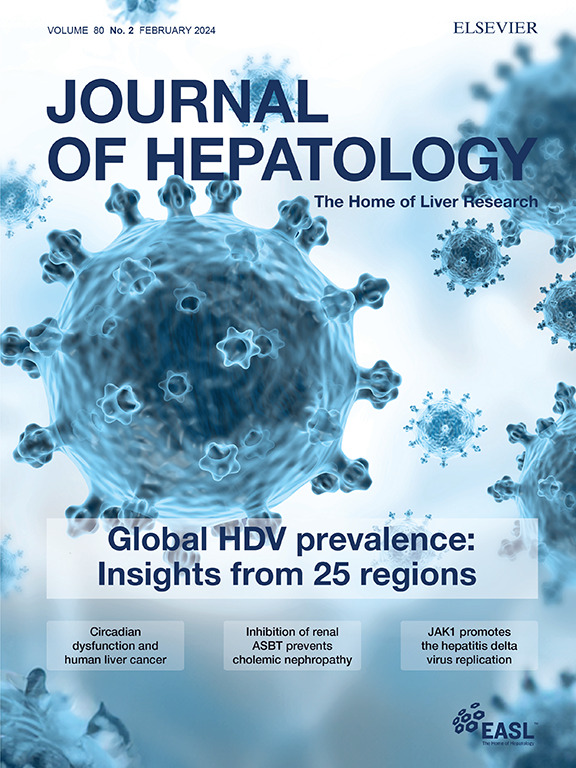Steatotic liver disease induces YAP/TAZ-driven cell competition that can suppress tumor initiation
IF 33
1区 医学
Q1 GASTROENTEROLOGY & HEPATOLOGY
引用次数: 0
Abstract
Background & Aims
Metabolic dysfunction-associated steatotic liver disease (MASLD) and its progressive form, metabolic dysfunction-associated steatohepatitis (MASH), are leading risk factors for liver cancer. While inflammation and fibrosis are known to promote tumorigenesis in advanced MASH, it remains unclear how earlier stages of MASLD contribute to cancer initiation. Here, we investigated how steatosis alone, in the absence of significant fibrosis and inflammation, influences liver cancer development in mouse models.Methods
We fed mice a Western diet to induce early-stage MASLD, characterized by steatosis and mild hepatitis without fibrosis. We triggered liver tumorigenesis by hydrodynamic tail vein injection of plasmids encoding oncogenes. We combined this with genetic manipulation of Hippo signaling and assessed tumor development by histology and single-nucleus RNA-sequencing.Results
Western diet suppressed liver tumor development by promoting the elimination of tumor-initiating cells. This effect was not due to a direct impact on oncogene-expressing cells, but rather to increased competitiveness of the surrounding hepatocytes. Mechanistically, the Western diet activated the Hippo pathway effectors Yap and Taz in steatotic hepatocytes, enhancing their cellular fitness and enabling them to outcompete tumor-initiating cells. The progression to advanced MASH abrogated this tumor-suppressing mechanism thus allowing tumor development.Conclusions
These findings reveal that steatotic hepatocytes in early MASLD can activate endogenous cell competition programs to suppress tumor initiation, a process that depends on Yap/Taz activity. This adds a new layer to our understanding of how fitness landscapes and cell-to-cell interactions within the tissue microenvironment shape cancer risk. It also shows that progression of chronic liver disease not only promotes tumorigenesis through effects of inflammation and fibrosis on tumor cells but also by disrupting the competitive defenses of normal surrounding cells.Impact and implications
We found that early stages of steatotic liver disease (MASLD) can suppress tumor initiation in mouse models of liver cancer by triggering Yap/Taz-mediated cell competition. This reveals an unexpected tumor-suppressive role for early MASLD and highlights the importance of non-cell autonomous mechanisms during tumor initiation. Since Hippo-YAP/TAZ signaling is deregulated in many cancers, similar cell competition-based mechanisms may operate in other tissues.

脂肪变性肝病诱导YAP/ taz驱动的细胞竞争,可以抑制肿瘤的发生
背景,目的:代谢功能障碍相关脂肪性肝病(MASLD)及其进行性形式代谢功能障碍相关脂肪性肝炎(MASH)是肝癌的主要危险因素。虽然已知炎症和纤维化可促进晚期MASH的肿瘤发生,但尚不清楚早期MASLD如何促进癌症的发生。在这里,我们研究了在没有明显纤维化和炎症的情况下,脂肪变性如何单独影响小鼠模型中肝癌的发展。方法用西餐诱导小鼠早期MASLD,以脂肪变性和轻度肝炎无纤维化为特征。我们通过尾静脉注射编码癌基因的质粒触发肝脏肿瘤发生。我们将其与Hippo信号的遗传操作相结合,并通过组织学和单核rna测序评估肿瘤的发展。结果西方饮食通过促进肿瘤起始细胞的清除来抑制肝脏肿瘤的发展。这种影响不是由于对癌基因表达细胞的直接影响,而是由于增加了周围肝细胞的竞争力。从机制上讲,西方饮食激活了脂肪变性肝细胞中的Hippo通路效应物Yap和Taz,增强了它们的细胞适应性,使它们能够战胜肿瘤启动细胞。进展到晚期MASH废除了这种肿瘤抑制机制,从而允许肿瘤发展。这些发现表明,早期MASLD的脂肪变性肝细胞可以激活内源性细胞竞争程序来抑制肿瘤的发生,这一过程依赖于Yap/Taz活性。这为我们理解组织微环境中的健康景观和细胞间相互作用如何影响癌症风险增加了一个新的层面。研究还表明,慢性肝病的进展不仅通过炎症和纤维化对肿瘤细胞的影响促进肿瘤发生,而且还通过破坏正常周围细胞的竞争性防御来促进肿瘤发生。影响和意义我们发现,早期脂肪变性肝病(MASLD)可以通过触发Yap/ taz介导的细胞竞争来抑制肝癌小鼠模型的肿瘤起始。这揭示了早期MASLD意想不到的肿瘤抑制作用,并强调了肿瘤起始过程中非细胞自主机制的重要性。由于Hippo-YAP/TAZ信号在许多癌症中不受调控,类似的基于细胞竞争的机制可能在其他组织中起作用。
本文章由计算机程序翻译,如有差异,请以英文原文为准。
求助全文
约1分钟内获得全文
求助全文
来源期刊

Journal of Hepatology
医学-胃肠肝病学
CiteScore
46.10
自引率
4.30%
发文量
2325
审稿时长
30 days
期刊介绍:
The Journal of Hepatology is the official publication of the European Association for the Study of the Liver (EASL). It is dedicated to presenting clinical and basic research in the field of hepatology through original papers, reviews, case reports, and letters to the Editor. The Journal is published in English and may consider supplements that pass an editorial review.
 求助内容:
求助内容: 应助结果提醒方式:
应助结果提醒方式:


